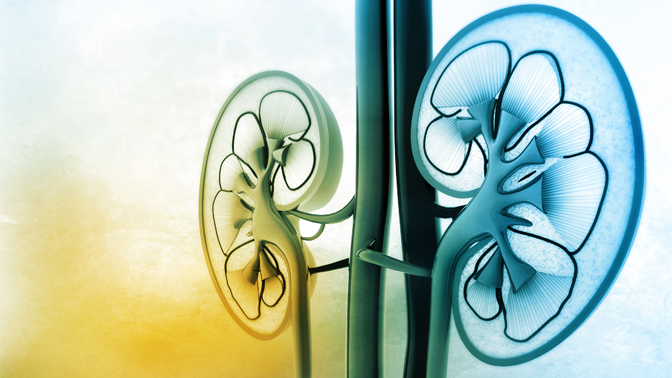
According to the actress Mae West ‘too much of a good thing can be wonderful.’ Unfortunately, this does not hold true for sugar: although it’s an important source of energy for our cells, too much of it can be bad for our health.
High blood sugar—a hallmark of diabetes—can damage the kidneys, promoting the development of diabetic nephropathy, a form of kidney disease that progressively impairs the organ’s function and can lead to kidney failure. Up to 50% of people with diabetes will develop diabetic nephropathy over their lifetime.
Although researchers do not fully understand the causes of diabetic nephropathy or how to prevent it, they have found that diabetic patients with unusually high levels of uric acid in their blood experience higher rates of the disease than those with average levels.
In light of these findings, TGHRI Scientist Dr. David Cherney led a clinical study to determine whether lowering uric acid levels in diabetic patients could help to protect their kidneys against damage. The study included 49 diabetes patients with no history of kidney problems who received the uric acid-lowering drug febuxostat for eight weeks and were subjected to a battery of physiological tests before and after the treatment period.
The researchers found that the drug decreased kidney pressure in several patients, which is beneficial given that high pressure damages the kidneys. However, when patients’ blood sugar was high, the drug triggered the constriction of the kidney’s blood vessels, which promotes kidney damage.
Albeit preliminary, these findings suggest that modulating uric acid levels could potentially protect some patients against diabetes-related kidney damage. They also suggest that an optimal range of uric acid levels exists and levels outside this range—whether too high or too low—can promote kidney damage. Rigorous clinical trials will provide more definitive proof of this and define the optimal range of uric acid levels.
This work was supported by the Canadian Diabetes Association, the Kidney Foundation of Canada, the Canadian Society of Nephrology, the Canadian Institutes of Health Research, the Banting and Best Diabetes Centre, the Heart and Stroke Foundation, the University of Toronto and the Toronto General & Western Hospital Foundation.
Lytvyn Y, Har R, Locke A, Lai V, Fong D, Advani A, Perkins BA, Cherney DZ. Renal and Vascular Effects of Uric Acid Lowering in Normouricemic Patients with Uncomplicated Type 1 Diabetes. Diabetes. 2017 Apr 13. doi: 10.2337/db17-0168.




